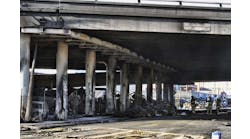President Obama is proposing a $10 per barrel oil tax, to be phased in over five years, that is intended to pay for transportation initiatives, including new rail corridors, highway projects, pilot projects for self-driving cars and other technologies the administration would consider to be part of a “clean transportation” system.
The White House announced this week that the budget to be presented to Congress next week will include an “oil fee” that would raise “the funding necessary to make these new investments, while also providing for the long-term solvency of the Highway Trust Fund to ensure we maintain the infrastructure we have.”
Two guesses how quickly Republicans came out swinging against it.
“Once again, the president expects hardworking consumers to pay for his out of touch climate agenda,” House Speaker Paul Ryan said in a statement. He said it was “little more than an election-year distraction” and that it would be “dead on arrival in Congress.”
Senate Finance Committee Chairman Orrin Hatch (R-Utah) said in an email to the Washington Post that “this is a backdoor gas tax hike and it’ll be hard-working American families that will have to foot the bill every time they go to the pump.”
The oil tax, which would work out to about 24 cents a gallon when fully in place, would create an incentive for the private sector to use oil products more efficiently, thus reducing the amount of climate-changing carbon dioxide released into the atmosphere. It is thus seen as a “two-fer” by those in support of the measure.
“Gasoline taxes haven’t been raised in 25 years, so actually rather than being radical, this proposal is simply returning to standard practice in place since the Eisenhower years of funding of transport infrastructure through small fuel taxes,” said Paul Bledsoe, an independent energy consultant in Washington who worked as a climate aide in the Clinton White House.
The White House said it would also again propose business tax reform. As part of that reform, lower corporate tax rates would encourage a one-time surge in federal revenues from previously untaxed profits currently being held overseas, generating funds that would help pay for the infrastructure program.
The administration said it would devote $20 billion of what is raised to expand transit systems in cities, suburbs and rural areas; make high-speed rail a viable alternative to flying in major regional corridors and invest in new rail technologies; modernize the nation’s freight system; and expand the Transportation Investment Generating Economic Recovery (TIGER) program launched in 2009 to support local projects. The budget would also use roughly $10 billion per year in revenues for shifting how local and state governments design regional transportation projects.


